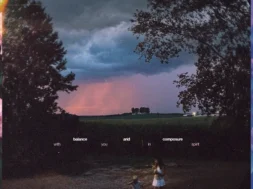 6
6 Canadian progressive metal group Protest The Hero return after a four year hiatus to deliver their latest album Palimpsest. Conceptually, Palimpsest explores significant moments throughout America’s historical narrative and offers frankly appropriate commentary complementary to the world’s current socio-political climate.
Beginning the album, “The Migrant Mother” built its atmosphere well as the first song. I liked the melodies it carried, but I felt like some of the vocals were buried under the instruments and were harder to follow at times. “The Canary”, about Amelia Earhart’s attempt to circumnavigate the globe, starts off with technically rich and energetic guitar parts, and lyrically stuck out to me right away. After listening to it all the way through, I felt the general vibe of the album was concretely established.
“From The Sky” is about the Hindenburg disaster and criticizes the ideas of rewriting history and how we often see the future with a flawed eye. Being one of the longest songs on the album, I felt like it not only had an interesting concept behind it, but it was one of the most dynamically diverse and interesting tracks I had heard so far.
The album’s first interlude “Harborside” begins with a softer piano riff, builds into a grandiose melody carried by a symphony of string instruments, and makes way for the sound of the full band to be seamlessly reintroduced on “All Hands”. ‘I’m dreaming of a life I can’t afford,’ among other lyrics on “All Hands” stuck out to me, and I enjoyed the pop influence the song seemed to have.
Frontman Rody Walker’s vocals take center stage on “The Fireside”, a song on the topic of the Great Depression that– ironically enough– aligns with what much of the world has been facing in the recent months. “Soliloquy” quickly establishes itself as one of the heaviest songs on Palimpset and gives commentary on prison systems, which I also found very appropriate for current events.
Within seconds, “Reverie” doesn’t hesitate to bring all-out instrumental brutality to the table. “Little Snakes” explores the corruption of power. String sounds are brought back into the mix here and complement Walker’s passionate delivery of his testimonial, and as the song progresses, it features a soft melodic interlude before rapidly changing to complex guitar and drum rhythms the song’s ending ultimately highlights.
“Mountainside” is the album’s second interlude with a bouncy piano melody, leading into the attention-grabbing “Gardenias,” a song that will have listeners fully engaged from start to finish.
Palimpsest’s final interlude “Hillside” is a silent musical palate cleanser, if you will, paving the way for the final track that lets the album go out with a grandiose bang, “Rivet.” The song is sonically rich, and the layers of strings complement Walker vehemently discussing the need for history to stop repeating itself and contemplating the American Dream.
Overall, I think this album was conceptually pretty strong, with each track telling of a crucial event in American history that implies a need to contemplate what we can do to make our future history better. Despite thinking otherwise initially, the vocals did shine throughout the album. One thing I would have enjoyed more would have been more interesting instrumental parts; there’s no argument this band’s technical skill is being showcased, but in some parts of the album it definitely started to get repetitive.
Stream Palimpsest and listen for yourself!
VERDICT
Favorite tracks: "All Hands," "The Fireside," "Little Snakes"















